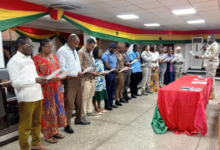Boost immune system before embarking on Hajj, Umrah – Dr Al-Hassan

A medical practitioner at the University of Ghana Hospital, Dr Abdul-Rahaman Al-Hassan, has advised pilgrims to Hajj and Umrah in Makkah, Saudi Arabia, to boost their immune system before embarking on such journey.
He advised them to consume food rich with Vitamin C, ensuring chronic diseases were stabled, not missing routine medication, and ensure adequate hydration.
Speaking to the Ghanaian Times on the prevalence of “Hajj cough” among the pilgrims during the just ended Hajj, Dr Al-Hassan who was also on the trip on official duties said pilgrims “must ultimately observe personal hygiene, cough etiquette and avoid cold drinks.”
The “Hajj cough” which is common among pilgrims is said to be associated with crowded conditions during the pilgrimage, which this year attracted more than two million people from across the globe, after three years of restriction of the numbers following the outbreak of COVID-19.
Sounds of cough and throat-clearing had been reverberating in Mosques and camps in Makkah and Medinah, in the Kingdom of Saudi Arabia, as the pilgrims gathered to perform the Hajj rituals.
The Saudi authorities had deployed medical brigades at vantages place in the hotels and camps, coupled with country level medical teams, responding to the common ailments of the pilgrims.
Dr Al-Hassan further told the Ghanaian Times that pilgrims were proned to the Middle East Respiratory Syndrome Coronavirus (MERS-Cov), adding that the coughs experienced by the pilgrims were symptoms of the disease.
“It is among the symptoms of MERS, especially at crowded place with poor ventilation. This worsens the symptoms of irritable cough and irritative sore-throat.
“This is zoonotic infection transmissible from animal (camel) to people,” he said.
Dr Al-Hassan added that as similar to the coronavirus family, the mode of transmission was through respiratory droplets.
“So individuals with MERS who sneeze and cough without appropriate etiquette, put others at risk,” he added.
“While some maybe asymptomatic, others may show mild to moderate symptoms of fever, cough and shortness of breath. This can be complicated by pneumonia and gastrointestinal symptoms like diarrhoea,” Dr Al-Hassan said.
He pointed out that severe MERS-Cov could result in respiratory failure, requiring mechanical ventilation and management in Intensive Care Unit, adding that there was no known vaccine.
BY SALIFU ABDUL-RAHAMAN







